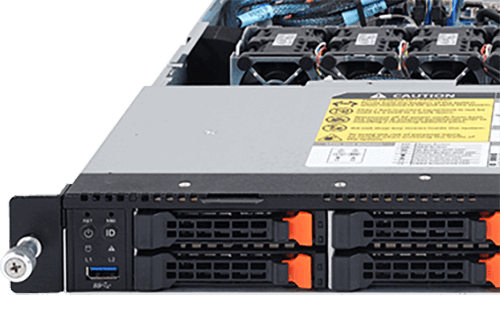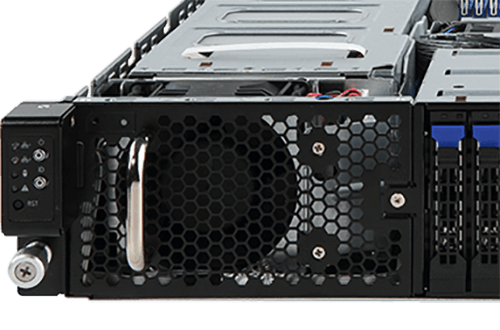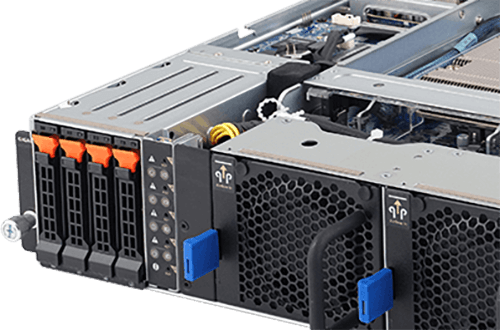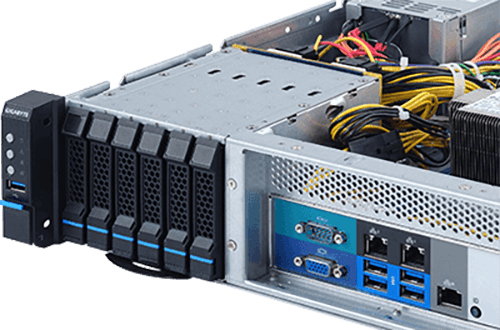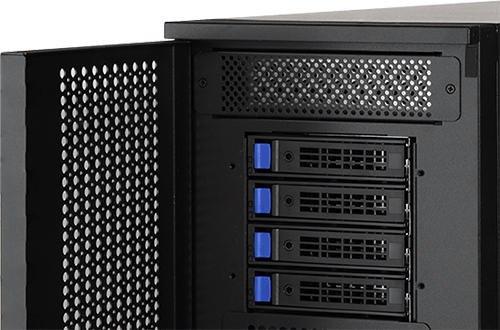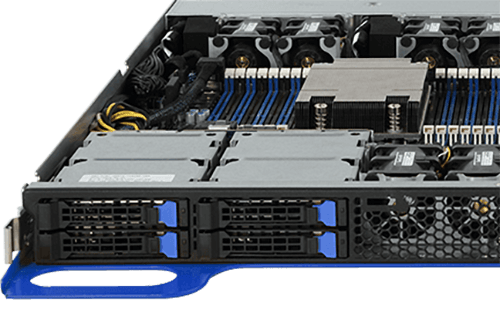- Home
- Enterprise
- High Density Servers
- H261-Z60
High Density Server - AMD EPYC™ 7002/7001 - 2U 4-Node DP 24-Bay SATA
- 2U 4-node with rear access server system
- Dual AMD EPYC™ 7002/7001 Series Processors per node
- 8-Channel DDR4 RDIMM/LRDIMM, 64 x DIMMs
- 8 x 1Gb/s LAN ports via Intel® I350-AM2
- 1 x CMC port
- 24 x 2.5" SATA hot-swappable bays
- 8 x M.2 slots with PCIe Gen3 x4 interface
- 8 x LP PCIe Gen3 x16 slots
- 4 x OCP 2.0 Gen3 x16 mezzanine slots
- Dual 2200W 80 PLUS Platinum redundant power supply
- Optimized performance with Mellanox Infiniband EDR 100G or Ethernet 100G products
* The entire materials provided herein are for reference only. GIGABYTE reserves the right to modify or revise the content at anytime without prior notice.
* Advertised performance is based on maximum theoretical interface values from respective Chipset vendors or organization who defined the interface specification. Actual performance may vary by system configuration.
* All trademarks and logos are the properties of their respective holders.
* Due to standard PC architecture, a certain amount of memory is reserved for system usage and therefore the actual memory size is less than the stated amount.
* Advertised performance is based on maximum theoretical interface values from respective Chipset vendors or organization who defined the interface specification. Actual performance may vary by system configuration.
* All trademarks and logos are the properties of their respective holders.
* Due to standard PC architecture, a certain amount of memory is reserved for system usage and therefore the actual memory size is less than the stated amount.
SPECIFICATIONS
Dimensions (WxHxD, mm)
2U 4-Node - Rear access
440 x 87 x 820
440 x 87 x 820
Motherboard
MZ61-HD0
CPU
AMD EPYC™ 7002 Series Processors
AMD EPYC™ 7001 Series Processors
Dual processor per node, 7nm technology
Up to 64 cores, 128 threads per processor
TDP up to 200W
Note: If only 1 CPU is installed, some PCIe or memory functions might be unavailable.
AMD EPYC™ 7001 Series Processors
Dual processor per node, 7nm technology
Up to 64 cores, 128 threads per processor
TDP up to 200W
Note: If only 1 CPU is installed, some PCIe or memory functions might be unavailable.
Socket
Per Node:
2 x LGA 4094
Total:
8 x LGA 4094
Socket SP3
2 x LGA 4094
Total:
8 x LGA 4094
Socket SP3
Chipset
System on Chip
Memory
Per node:
16 x DIMM slots
Total:
64 x DIMM slots
DDR4 memory supported only
8-Channel memory architecture
RDIMM up to 128GB supported
LRDIMM up to 128GB supported
Memory speed: Up to 3200*/2933 MT/s
*Follow BIOS setting and memory QVL if running 3200 MT/s.
16 x DIMM slots
Total:
64 x DIMM slots
DDR4 memory supported only
8-Channel memory architecture
RDIMM up to 128GB supported
LRDIMM up to 128GB supported
Memory speed: Up to 3200*/2933 MT/s
*Follow BIOS setting and memory QVL if running 3200 MT/s.
LAN
Per node:
2 x 1Gb/s LAN ports (1 x Intel® I350-AM2)
Support NCSI function
1 x 10/100/1000 Mbps Management port
Total:
8 x 1Gb/s LAN ports (4 x Intel® I350-AM2)
Support NCSI function
4 x 10/100/1000 Mbps Management ports
1 x 10/100/1000 CMC port
2 x 1Gb/s LAN ports (1 x Intel® I350-AM2)
Support NCSI function
1 x 10/100/1000 Mbps Management port
Total:
8 x 1Gb/s LAN ports (4 x Intel® I350-AM2)
Support NCSI function
4 x 10/100/1000 Mbps Management ports
1 x 10/100/1000 CMC port
Video
Integrated in Aspeed® AST2500 x 4
- 4 x VGA ports
- 4 x VGA ports
Storage
Per node:
6 x 2.5" SATA hot-swappable bays
or
4 x 2.5" SATA/SAS hot-swappable bays with SAS RAID Card
Total:
24 x 2.5" hot-swappable bays
SAS card is required for SAS devices support
6 x 2.5" SATA hot-swappable bays
or
4 x 2.5" SATA/SAS hot-swappable bays with SAS RAID Card
Total:
24 x 2.5" hot-swappable bays
SAS card is required for SAS devices support
RAID
Depends on SAS add-in cards
Expansion Slots
Per node:
2 x PCIe x16 (Gen3 x16) low-profile slots, from CPU_0
1 x OCP mezzanine slot with PCIe Gen3 x16 bandwidth, from CPU_0
1 x M.2 slot:
- M-key
- PCIe Gen3 x4, from CPU_0
- Supports 2242/2260/2280/22110 cards
- CPU TDP is limited to 120W if using M.2 device
1 x M.2 slot:
- M-key
- PCIe Gen3 x4, from CPU_1
- Supports 2242/2260/2280/22110 cards
- CPU TDP is limited to 120W if using M.2 device
Total:
8 x PCIe x16 (Gen3 x16) low-profile slots, from CPU_0
4 x OCP mezzanine slots with PCIe Gen3 x16 bandwidth, from CPU_0
4 x M.2 slots:
- M-key
- PCIe Gen3 x4, from CPU_0
- Supports 2242/2260/2280/22110 cards
- CPU TDP is limited to 120W if using M.2 device
4 x M.2 slots:
- M-key
- PCIe Gen3 x4, from CPU_1
- Supports 2242/2260/2280/22110 cards
- CPU TDP is limited to 120W if using M.2 device
2 x PCIe x16 (Gen3 x16) low-profile slots, from CPU_0
1 x OCP mezzanine slot with PCIe Gen3 x16 bandwidth, from CPU_0
1 x M.2 slot:
- M-key
- PCIe Gen3 x4, from CPU_0
- Supports 2242/2260/2280/22110 cards
- CPU TDP is limited to 120W if using M.2 device
1 x M.2 slot:
- M-key
- PCIe Gen3 x4, from CPU_1
- Supports 2242/2260/2280/22110 cards
- CPU TDP is limited to 120W if using M.2 device
Total:
8 x PCIe x16 (Gen3 x16) low-profile slots, from CPU_0
4 x OCP mezzanine slots with PCIe Gen3 x16 bandwidth, from CPU_0
4 x M.2 slots:
- M-key
- PCIe Gen3 x4, from CPU_0
- Supports 2242/2260/2280/22110 cards
- CPU TDP is limited to 120W if using M.2 device
4 x M.2 slots:
- M-key
- PCIe Gen3 x4, from CPU_1
- Supports 2242/2260/2280/22110 cards
- CPU TDP is limited to 120W if using M.2 device
Internal I/O
Per node:
1 x TPM header
1 x TPM header
Front I/O
Per node:
1 x Power button with LED
1 x ID button with LED
1 x System status LED
Total:
4 x Power buttons with LED
4 x ID buttons with LED
4 x System status LEDs
*1 x CMC status LED
*Only one CMC status LED per system.
1 x Power button with LED
1 x ID button with LED
1 x System status LED
Total:
4 x Power buttons with LED
4 x ID buttons with LED
4 x System status LEDs
*1 x CMC status LED
*Only one CMC status LED per system.
Rear I/O
Per node:
2 x USB 3.0
1 x VGA
2 x RJ45
1 x MLAN
1 x ID LED
Total:
8 x USB 3.0
4 x VGA
8 x RJ45
4 x MLAN
4 x ID LEDs
*1 x CMC port
*Only one CMC port per system.
2 x USB 3.0
1 x VGA
2 x RJ45
1 x MLAN
1 x ID LED
Total:
8 x USB 3.0
4 x VGA
8 x RJ45
4 x MLAN
4 x ID LEDs
*1 x CMC port
*Only one CMC port per system.
Backplane Board
Speed and bandwidth:
SATA 6Gb/s or SAS 12Gb/s
SATA 6Gb/s or SAS 12Gb/s
TPM
1 x TPM header with LPC interface
- Optional TPM2.0 kit: CTM000
- Optional TPM2.0 kit: CTM000
Power Supply
Dual 2200W 80 PLUS Platinum redundant power supply
AC Input:
- 100-127V~/ 14A, 47-63Hz
- 200-240V~/ 12.6A, 47-63Hz
DC Input: (Only for China)
- 240Vdc/ 12.6A
DC Output:
- Max 1200W/ 100-127V~
+12.12V/ 95.6A
+12Vsb/ 3.5A
- Max 2200W/ 200-240V~ or 240Vdc Input
+12.12V/ 178.1A
+12Vsb/ 3.5A
Note:
1) The system power supply requires C19 power cord.
2) 2000W 80 PLUS Titanium power supply as an option.
AC Input:
- 100-127V~/ 14A, 47-63Hz
- 200-240V~/ 12.6A, 47-63Hz
DC Input: (Only for China)
- 240Vdc/ 12.6A
DC Output:
- Max 1200W/ 100-127V~
+12.12V/ 95.6A
+12Vsb/ 3.5A
- Max 2200W/ 200-240V~ or 240Vdc Input
+12.12V/ 178.1A
+12Vsb/ 3.5A
Note:
1) The system power supply requires C19 power cord.
2) 2000W 80 PLUS Titanium power supply as an option.
System Management
Aspeed® AST2500 Baseboard Management Controller
Aspeed® AST2520 Chassis Management Controller
GIGABYTE Management Console web interface
Aspeed® AST2520 Chassis Management Controller
GIGABYTE Management Console web interface
- Dashboard
- JAVA Based Serial Over LAN
- HTML5 KVM
- Sensor Monitor (Voltage, RPM, Temperature, CPU Status …etc.)
- Sensor Reading History Data
- FRU Information
- SEL Log in Linear Storage / Circular Storage Policy
- Hardware Inventory
- Fan Profile
- System Firewall
- Power Consumption
- Power Control
- LDAP / AD / RADIUS Support
- Backup & Restore Configuration
- Remote BIOS/BMC/CPLD Update
- Event Log Filter
- User Management
- Media Redirection Settings
- PAM Order Settings
- SSL Settings
- SMTP Settings
OS Compatibility
For AMD EPYC™ 7002 Series processors
Citrix Hypervisor 8.1.0 or later
Red Hat Enterprise Linux 7.6 or later
Red Hat Enterprise Linux 8.0 or later
Red Hat Enterprise Linux 9.0 or later
SUSE Linux Enterprise Server 12 SP4 or later
SUSE Linux Enterprise Server 15 SP1 or later
Ubuntu 16.04.6 LTS or later
Ubuntu 18.04.3 LTS or later
Ubuntu 20.04 LTS or later
VMware ESXi 6.5 EP15 or later
VMware ESXi 6.7 Update3 or later
VMware ESXi 7.0 or later
VMware ESXi 8.0 or later
Windows Server 2016 (X2APIC/256T not supported)
Windows Server 2019
For AMD EPYC™ 7001 Series processors
Citrix Xenserver 7.1.0 CU2 or later
Citrix Xenserver 7.4.0 or later
Citrix Hypervisor 8.0.0 or later
Red Hat Enterprise Linux 7.4 or later
Red Hat Enterprise Linux 8.0 or later
Red Hat Enterprise Linux 9.0 or later
SUSE Linux Enterprise Server 11 SP4 or later
SUSE Linux Enterprise Server 12 SP3 or later
SUSE Linux Enterprise Server 15 or later
Ubuntu 16.04 LTS or later
Ubuntu 18.04 LTS or later
Ubuntu 20.04 LTS or later
VMware ESXi 6.5 Update1 or later
VMware ESXi 6.7 or later
VMware ESXi 7.0 or later
VMware ESXi 8.0 or later
Windows Server 2012 R2 with Update
Windows Server 2016
Citrix Hypervisor 8.1.0 or later
Red Hat Enterprise Linux 7.6 or later
Red Hat Enterprise Linux 8.0 or later
Red Hat Enterprise Linux 9.0 or later
SUSE Linux Enterprise Server 12 SP4 or later
SUSE Linux Enterprise Server 15 SP1 or later
Ubuntu 16.04.6 LTS or later
Ubuntu 18.04.3 LTS or later
Ubuntu 20.04 LTS or later
VMware ESXi 6.5 EP15 or later
VMware ESXi 6.7 Update3 or later
VMware ESXi 7.0 or later
VMware ESXi 8.0 or later
Windows Server 2016 (X2APIC/256T not supported)
Windows Server 2019
For AMD EPYC™ 7001 Series processors
Citrix Xenserver 7.1.0 CU2 or later
Citrix Xenserver 7.4.0 or later
Citrix Hypervisor 8.0.0 or later
Red Hat Enterprise Linux 7.4 or later
Red Hat Enterprise Linux 8.0 or later
Red Hat Enterprise Linux 9.0 or later
SUSE Linux Enterprise Server 11 SP4 or later
SUSE Linux Enterprise Server 12 SP3 or later
SUSE Linux Enterprise Server 15 or later
Ubuntu 16.04 LTS or later
Ubuntu 18.04 LTS or later
Ubuntu 20.04 LTS or later
VMware ESXi 6.5 Update1 or later
VMware ESXi 6.7 or later
VMware ESXi 7.0 or later
VMware ESXi 8.0 or later
Windows Server 2012 R2 with Update
Windows Server 2016
System Fans
8 x 80x80x38mm (16,300rpm)
Operating Properties
Operating temperature: 10°C to 35°C
Operating humidity: 8-80% (non-condensing)
Non-operating temperature: -40°C to 60°C
Non-operating humidity: 20%-95% (non-condensing)
Operating humidity: 8-80% (non-condensing)
Non-operating temperature: -40°C to 60°C
Non-operating humidity: 20%-95% (non-condensing)
Weight
35 kg (full packaging)
Packaging Dimensions
1167 x 700 x 309 mm
Packaging Content
1 x H261-Z60
8 x CPU heatsinks
1 x Rail kit
8 x CPU heatsinks
1 x Rail kit
Part Numbers
- Barebone package: 6NH261Z60MR-00-A*
- Motherboard: 9MZ61HD0NR-00-2*
- Rail kit: 25HB2-AN6103-K0R
- CPU heatsink: 25ST1-44320H-A0R/25ST1-44320I-A0R
- Backplane board - CBPH0O0: 9CBPH0O0NR-00
- Fan module: 25ST2-883828-D0R/25ST2-88382A-D0R
- Power supply: 25EP0-222001-D0S
Optional parts:
- C19 power cord 125V/15A (US): 25CP1-018000-Q0R
- C19 power cord 250V/16A (EU): 25CP3-01830H-Q0R
- Ring topology kit: 6NH23NR48SR-00
- Motherboard: 9MZ61HD0NR-00-2*
- Rail kit: 25HB2-AN6103-K0R
- CPU heatsink: 25ST1-44320H-A0R/25ST1-44320I-A0R
- Backplane board - CBPH0O0: 9CBPH0O0NR-00
- Fan module: 25ST2-883828-D0R/25ST2-88382A-D0R
- Power supply: 25EP0-222001-D0S
Optional parts:
- C19 power cord 125V/15A (US): 25CP1-018000-Q0R
- C19 power cord 250V/16A (EU): 25CP3-01830H-Q0R
- Ring topology kit: 6NH23NR48SR-00
* The entire materials provided herein are for reference only. GIGABYTE reserves the right to modify or revise the content at anytime without prior notice.
* Advertised performance is based on maximum theoretical interface values from respective Chipset vendors or organization who defined the interface specification. Actual performance may vary by system configuration.
* All trademarks and logos are the properties of their respective holders.
* Due to standard PC architecture, a certain amount of memory is reserved for system usage and therefore the actual memory size is less than the stated amount.
* Advertised performance is based on maximum theoretical interface values from respective Chipset vendors or organization who defined the interface specification. Actual performance may vary by system configuration.
* All trademarks and logos are the properties of their respective holders.
* Due to standard PC architecture, a certain amount of memory is reserved for system usage and therefore the actual memory size is less than the stated amount.
SUPPORT
Driver
BIOS
Utility
Firmware
QVL
- All
- All
- Windows Server 2019
- Windows Server 2016 64bit
Chipset
Chipset
Version
Size
Date
AMD Chipset Driver
Version : 1.07.12.1102
17.05 MB
Aug 06, 2019
OS: Windows Server 2016 64bit,Windows Server 2019
LAN
LAN
Version
Size
Date
Intel® LAN Driver and Utility
Version : 24.0
542.58 MB
Aug 06, 2019
OS: Windows Server 2016 64bit,Windows Server 2019
VGA
VGA
Version
Size
Date
ASPEED Graphic Driver
Version : 1.06
1.78 MB
Aug 06, 2019
OS: Windows Server 2016 64bit,Windows Server 2019
BIOS
Description
Version
Size
Date
Windows and UEFI mode flash BIOS SOP
Please download BIOS update tool from AMI Website
-
0.31 MB
Jan 29, 2021
Warning:
Because BIOS flashing is potentially risky, if you do not encounter problems using the current version of BIOS, it is recommended that you not flash the BIOS. To flash the BIOS, do it with caution. Inadequate BIOS flashing may result in system malfunction.
What is a BETA?
BETA describes a new version that is reliable yet may not include all the features of the final product. During this phase we are previewing new features and gathering customer input to insure our product provides the best experience possible.
Because BIOS flashing is potentially risky, if you do not encounter problems using the current version of BIOS, it is recommended that you not flash the BIOS. To flash the BIOS, do it with caution. Inadequate BIOS flashing may result in system malfunction.
What is a BETA?
BETA describes a new version that is reliable yet may not include all the features of the final product. During this phase we are previewing new features and gathering customer input to insure our product provides the best experience possible.
- All
- All
- Windows Server 2022
- Windows Server 2019
- Windows Server 2016 R2 64bit
- Windows Server 2016 64bit
- Windows Server 2012 R2 64bit
- Windows Server 2012 64bit
- Windows 10 64bit
- VMware
- Ubuntu
- Linux CentOS
- Linux
Utility
Description
Version
Size
Date
GSM CLI
Version : 2.1.78
147.79 MB
Dec 12, 2024
OS: Windows Server 2012 64bit,Windows Server 2012 R2 64bit,Linux CentOS,Windows 10 64bit,Ubuntu,Windows Server 2016 R2 64bit,Windows Server 2019,Windows Server 2022
GSM Server
Version : 2.12
926.33 MB
Jan 18, 2023
OS: Linux,Windows Server 2016 64bit,Windows Server 2019
GSM Agent
Version : 2.5
720.29 MB
Dec 27, 2021
OS: Linux,Windows Server 2016 64bit,Windows Server 2019
Firmware
Description
Version
Size
Date
BMC Firmware with embedded GIGABYTE Management Console
(AST2500 AMI)
(AST2500 AMI)
Version : 12.61.35
105.32 MB
Mar 20, 2025
English
CMC Firmware (AST2520)
Note: Please make sure the system CMC firmware version is 12.40.19 or later before updating BMC firmware
Note: Please make sure the system CMC firmware version is 12.40.19 or later before updating BMC firmware
Version : 12.41.36
83.16 MB
Nov 02, 2023
English
Manual
Description
Version
Size
Date
Description
Version
Size
Date
RESOURCES
Success Case
Articles

Success Case | June 02, 2023
NCHC and Xanthus Elevate Taiwanese Animation on the World Stage with GIGABYTE Servers
Created by Greener Grass Production, the Taiwanese sci-fi mini-series “2049” made its debut on Netflix and various local TV channels. The animated spin-off “2049+ Voice of Rebirth”, crafted by Xanthus Animation Studio, premiered on the streaming service myVideo. The CGI show was created with the NCHC Render Farm’s GIGABYTE servers, which employ top-of-the-line NVIDIA® graphics cards to empower artists with industry-leading rendering capabilities. The servers can take on multiple workloads simultaneously through parallel computing, and they boast a wide range of patented smart features that ensure stability and availability. With all it has going for it, “2049+ Voice of Rebirth” may garner enough attention to become the breakout hit that will introduce Taiwanese animation to international audiences.

Success Case | May 30, 2023
Spain’s IFISC Tackles COVID-19, Climate Change with GIGABYTE Servers
By using GIGABYTE, Spain’s Institute for Cross-Disciplinary Physics and Complex Systems is pitting the world’s foremost server solutions against some of the world’s most pressing issues, including the effects of climate change, pollution, and COVID-19. GIGABYTE servers are up to the diverse and daunting tasks, because they are designed for high performance computing, intensive numerical simulations, AI development, and big data management.

Success Case | March 07, 2023
Satisfying Your Need for Speed: Server Technology Helps to Achieve Aerodynamic Vehicle Design
A world-renowned automotive manufacturer uses Computational Fluid Dynamics (CFD) simulation software, analyzing huge amounts of data to optimize the design of their vehicles. They selected GIGABYTE’s high density multi-node servers to build a high-performance computing cluster for their vehicle design center, making the most efficient use of the limited space available to deliver maximum computing power to their aerodynamic engineering team.

Success Case | February 17, 2023
GIGABYTE Servers Become Part of the German Aerospace Center’s Data Center
When the German Aerospace Center (Deutsches Zentrum für Luft- und Raumfahrt, abbreviated as DLR) wanted to expand their data center, they searched for servers that could operate smoothly in an ambient temperature of 40°C without the need for air conditioning. GIGABYTE’s server team provided a solution from its High Density Server product line that combined computing, storage, and connectivity in a single system. The High Density Servers are equipped with liquid-cooling technology to run without a hitch in high-temperature environments, enabling the data center to efficiently process an enormous amount of space-related research data in the limited space available.

Tech Guide | July 18, 2023
How to Pick a Cooling Solution for Your Servers? A Tech Guide by GIGABYTE
As CPUs and GPUs continue to advance, they consume more power and generate more heat. It is vital to keep temperature control in mind when purchasing servers. A good cooling solution keeps things running smoothly without hiking up the energy bill or requiring persistent maintenance. GIGABYTE Technology, an industry leader in high-performance servers, presents this Tech Guide to help you choose a suitable cooling solution. We analyze three popular options—air, liquid, immersion—and demonstrate what GIGABYTE can do for you.

Tech Guide | October 27, 2022
Data Center Cooling: The Key to Green Computing and a Low-Carbon Transition

Tech Guide | May 31, 2022
What is Private Cloud, and is it Right for You?
In the era of cloud computing, just about everyone has heard of the terms “private cloud” and “public cloud”. Chances are, you are using one or both of them in your everyday life—but how much do you really know about them? If you had the chance, could you build a private cloud for yourself or your organization? GIGABYTE Technology, an industry leader in server solutions used by global cloud service providers, is pleased to present our latest Tech Guide. We will examine the difference between private and public clouds, introduce the private cloud’s advantages and limitations, and then introduce GIGABYTE products that may help you build and operate a private cloud of your own.

Tech Guide | March 16, 2022
What is Big Data, and How Can You Benefit from It?
You may be familiar with the term, “big data”, but how firm is your grasp of the concept? Have you heard of the “5 V’s” of big data? Can you recite the “Three Fundamental Steps” of how to use big data? Most importantly, do you know how to reap the benefits through the use of the right tools? GIGABYTE Technology, an industry leader in high-performance server solutions, is pleased to present our latest Tech Guide. We will walk you through the basics of big data, explain why it boasts unlimited potential, and finally delve into the GIGABYTE products that will help you ride high on the most exciting wave to sweep over the IT sector.

Tech Guide | February 11, 2022
The Advantages of ARM: From Smartphones to Supercomputers and Beyond
Processors based on the ARM architecture, an alternative to the mainstream x86 architecture, is gradually making the leap from mobile devices to servers and data centers. In this Tech Guide, GIGABYTE Technology, an industry leader in high-performance server solutions, recounts how ARM was developed. We also explain the various benefits of ARM processors and recommend ARM servers for different sectors and applications.

Tech Guide | January 11, 2022
Cluster Computing: An Advanced Form of Distributed Computing
Cluster computing is a form of distributed computing that is similar to parallel or grid computing, but categorized in a class of its own because of its many advantages, such as high availability, load balancing, and HPC. GIGABYTE Technology, an industry leader in high-performance servers, presents this tech guide to help you learn about cluster computing. We also recommend GIGABYTE servers that can help you benefit from cluster computing.

Tech Guide | January 10, 2022
Setting the Record Straight: What is HPC? A Tech Guide by GIGABYTE
The term HPC, which stands for high performance computing, gets thrown around a lot nowadays, as server solutions become more and more ubiquitous. It is running the risk of becoming a catchall phrase: anything that is “HPC” must be the right choice for your computing needs. You may be wondering: what exactly are the benefits of HPC, and is HPC right for you? GIGABYTE Technology, an industry leader in high-performance servers, presents this tech guide to help you understand what HPC means on both a theoretical and a practical level. In doing so, we hope to help you evaluate if HPC is right for you, while demonstrating what GIGABYTE has to offer in the field of HPC.

5G | October 07, 2019
Looking Towards 5G and the Transformation of Our Technology Ecosystem
When everything in the world becomes connected to the internet, human society will become a huge, highly intelligent organism. The “brain” of this organism will be the cloud, and its limbs will be a variety of end applications such as smart phones, AI-enabled robots, self-driving cars and smart factories.
Video

Video | July 28, 2021
Heroes Ascension
Over the past year or so, due to global warming and climate changes, all parts of the world have witnessed extreme weather events that are more severe than ...

Video | March 25, 2021
What is it? Data Center in 60 Seconds
What is a data center? A data center is a facility that an organization uses for housing their IT equipment, including servers, storage, ...
News
Security & Technical Advisory
Others
Back to H261-Z60








